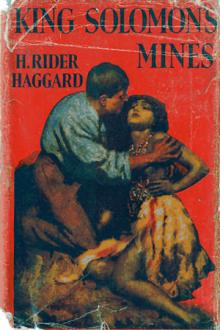King Solomon’s Mines by H. Rider Haggard (inspirational books for women TXT) 📕

- Author: H. Rider Haggard
Book online «King Solomon’s Mines by H. Rider Haggard (inspirational books for women TXT) 📕». Author H. Rider Haggard
By H. Rider Haggard.
Table of Contents Titlepage Imprint Dedication Author’s Note Introduction King Solomon’s Mines I: I Meet Sir Henry Curtis II: The Legend of Solomon’s Mines III: Umbona Enters Our Service IV: An Elephant Hunt V: Our March Into the Desert VI: Water! Water! VII: Solomon’s Road VIII: We Enter Kukuanaland IX: Twala the King X: The Witch-Hunt XI: We Give a Sign XII: Before the Battle XIII: The Attack XIV: The Last Stand of the Greys XV: Good Falls Sick XVI: The Place of Death XVII: Solomon’s Treasure Chamber XVIII: We Abandon Hope XIX: Ignosi’s Farewell XX: Found Endnotes List of Illustrations Colophon Uncopyright ImprintThis ebook is the product of many hours of hard work by volunteers for Standard Ebooks, and builds on the hard work of other literature lovers made possible by the public domain.
This particular ebook is based on a transcription produced for Project Gutenberg and on digital scans available at the HathiTrust Digital Library.
The writing and artwork within are believed to be in the U.S. public domain, and Standard Ebooks releases this ebook edition under the terms in the CC0 1.0 Universal Public Domain Dedication. For full license information, see the Uncopyright at the end of this ebook.
Standard Ebooks is a volunteer-driven project that produces ebook editions of public domain literature using modern typography, technology, and editorial standards, and distributes them free of cost. You can download this and other ebooks carefully produced for true book lovers at standardebooks.org.
This faithful but unpretending record
of a remarkable adventure
is hereby respectfully dedicated
by the narrator,
Allan Quatermain,
to all the big and little boys who read it.
The author ventures to take this opportunity to thank his readers for the kind reception they have accorded to the successive editions of this tale during the last twelve years. He hopes that in its present form it will fall into the hands of an even wider public, and that in years to come it may continue to afford amusement to those who are still young enough at heart to love a story of treasure, war, and wild adventure.
Ditchingham,
11th March, 1898.
Post Scriptum
Now, in 1907, on the occasion of the issue of this edition, I can only add how glad I am that my romance should continue to please so many readers. Imagination has been verified by fact; the King Solomon’s Mines I dreamed of have been discovered, and are putting out their gold once more, and, according to the latest reports, their diamonds also; the Kukuanas or, rather, the Matabele, have been tamed by the white man’s bullets, but still there seem to be many who find pleasure in these simple pages. That they may continue so to do, even to the third and fourth generation, or perhaps longer still, would, I am sure, be the hope of our old and departed friend, Allan Quatermain.
H. Rider Haggard.
Ditchingham, 1907.
IntroductionNow that this book is printed, and about to be given to the world, a sense of its shortcomings both in style and contents, weighs very heavily upon me. As regards the latter, I can only say that it does not pretend to be a full account of everything we did and saw. There are many things connected with our journey into Kukuanaland that I should have liked to dwell upon at length, which, as it is, have been scarcely alluded to. Amongst these are the curious legends which I collected about the chain armour that saved us from destruction in the great battle of Loo, and also about the Silent Ones or Colossi at the mouth of the stalactite cave. Again, if I had given way to my own impulses, I should have wished to go into the differences, some of which are to my mind very suggestive, between the Zulu and Kukuana dialects. Also a few pages might have been given up profitably to the consideration of the indigenous flora and fauna of Kukuanaland.1 Then there remains the most interesting subject—that, as it is, has only been touched on incidentally—of the magnificent system of military organisation in force in that country, which, in my opinion, is much superior to that inaugurated by Chaka in Zululand, inasmuch as it permits of even more rapid mobilisation, and does not necessitate the employment of the pernicious system of enforced celibacy. Lastly, I have scarcely spoken of the domestic and family customs of the Kukuanas, many of which are exceedingly quaint, or of their proficiency in the art of smelting and welding metals. This science they carry to considerable perfection, of which a good example is to be seen in their tollas, or heavy throwing knives, the backs of these weapons being made of hammered iron, and the edges of beautiful steel welded with great skill on to the iron frames. The fact of the matter is, I thought, with Sir Henry Curtis and Captain Good, that the best plan would be to tell my story in a plain, straightforward manner, and to leave these matters to be dealt with subsequently in whatever way ultimately may appear to be desirable. In the meanwhile I shall, of course, be delighted to give all information in my power to anybody interested in such things.
And now it only remains for me to offer apologies for my blunt way of writing. I can but say in excuse of it that I am more accustomed to handle a rifle than a pen, and cannot make any pretence to the grand literary flights and flourishes which I see in novels—for sometimes I like to read a novel. I suppose they—the flights and flourishes—are





Comments (0)